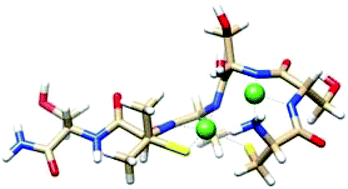N-Terminally free but C-terminally amidated peptides Pen-SSACS-NH2 and CSSA-Pen-S-NH2 containing L-penicillamine (Pen) in sequence have been synthesized and their nickel(II), zinc(II) and cadmium(II) complexes were studied by potentiometric and spectroscopic measurements. This study is the first example of the synthesis and metal complexes of peptides containing penicillamine in a peptide sequence constructed from natural amino acids. The data were compared to those of the two cysteine counterparts, CSSACS-NH2. It was found that the replacement of L-cysteine with L-penicillamine has a significant impact on the complex formation processes with nickel(II) ions. The major differences include the suppression of polynuclear complex formation, the enhanced metal binding affinity of the amino terminus and the increased tendency for the formation of amide bonded species. The tridentate (NH2,S–,S−) coordination was characteristic of the zinc(II) and cadmium(II) complexes in the case of all three peptides containing two thiolate functions.
